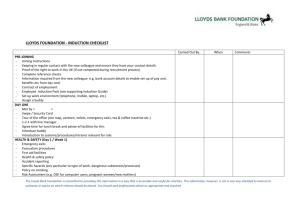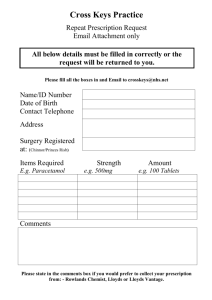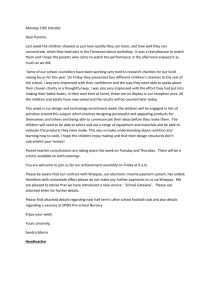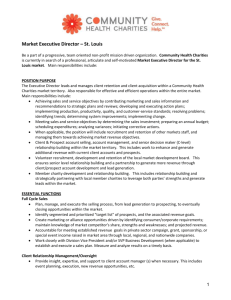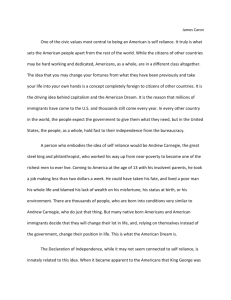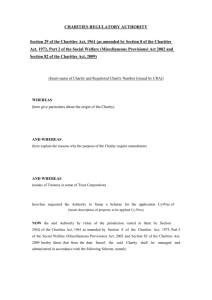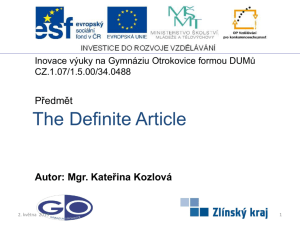Lloyds Banking Group template with instructions
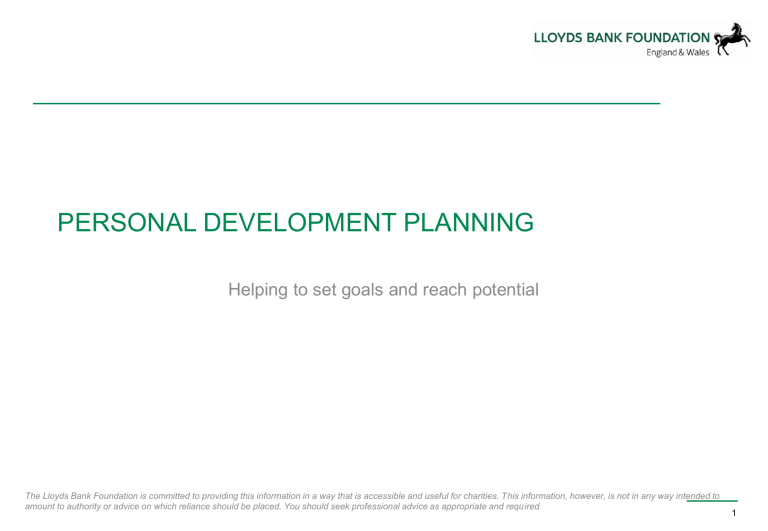
PERSONAL DEVELOPMENT PLANNING
Helping to set goals and reach potential
The Lloyds Bank Foundation is committed to providing this information in a way that is accessible and useful for charities. This information, however, is not in any way intended to amount to authority or advice on which reliance should be placed. You should seek professional advice as appropriate and requ ired
1
PERSONAL DEVELOPMENT – WHAT IS IT?
• Personal Development is the pursuit of personal growth by expanding self-awareness and knowledge and improving personal skills
• In the context of work environments, is also commonly defined as the process of improving your skills and increasing the amount of experience that you have in your job
• Great personal development is based around creating goals which help support personal change, growth, progress, advancement, and improvement
• Development plans provide an important way for people to drive personal and business improvement by providing a framework that helps them to build new skills, refine behaviours and acquire different experiences
The Lloyds Bank Foundation is committed to providing this information in a way that is accessible and useful for charities. This information, however, is not in any way intended to amount to authority or advice on which reliance should be placed. You should seek professional advice as appropriate and required
2
WHY DO WE NEED DEVELOPMENT GOALS?
We need Development Goals to help us:
• Drive both Personal and Business improvement
• Move with organisational and customer driven changes
• Address gaps in our knowledge
• Keep up to date with developments in our profession
• Achieve Professional Standards where relevant
• Prepare for our next role and achieve our career goals
• Developing strengths or talents
• Identifying or improving potential
• Enhancing lifestyle or the quality of life
Line Managers have an important role to play in supporting colleagues with their Development Goals.
The Lloyds Bank Foundation is committed to providing this information in a way that is accessible and useful for charities. This information, however, is not in any way intended to amount to authority or advice on which reliance should be placed. You should seek professional advice as appropriate and required
3
CREATING GREAT DEVELOPMENT GOALS
1. Focus on up to three Development Goals
Ask yourself the following questions:
• What do you want to achieve this year and longer term?
• What are your greatest strengths and how can you build on them?
• What could you improve that would make it easier to do your job?
• Do you want to learn about a particular department or further develop a skill or area of knowledge?
• What improvement would have the greatest impact on your performance?
• What support will you need to undertake development activities?
• What are the best ways for you to achieve this Development Goal?
• What can you learn through doing your job or from others?
The Lloyds Bank Foundation is committed to providing this information in a way that is accessible and useful for charities. This information, however, is not in any way intended to amount to authority or advice on which reliance should be placed. You should seek professional advice as appropriate and required
4
CREATING GREAT DEVELOPMENT GOALS
2. Include realistic activities to help you achieve
• Line Managers should help colleagues to think creatively about their goals and how best to achieve them, for example:
• Shadowing others
• Getting a mentor
• Informal coaching
• Training (all forms)
• Volunteering
• Reading articles
• Networking
• Professional Qualifications
• Ask yourself – what has worked for you before; can you learn from that?
• You should ensure you describe the need, not just your preferred solution, to help you judge if the goal has been met.
The Lloyds Bank Foundation is committed to providing this information in a way that is accessible and useful for charities. This information, however, is not in any way intended to amount to authority or advice on which reliance should be placed. You should seek professional advice as appropriate and requ ired
5
CREATING GREAT DEVELOPMENT GOALS
3. Review and update your Development Goals
• Be honest with yourself about whether you have given these goals the focus they need
• Keep a log of learning experiences
• Consider where your performance has benefited from completion of a Development
Goal
• Development requires action it won’t happen by magic!
The Lloyds Bank Foundation is committed to providing this information in a way that is accessible and useful for charities. This information, however, is not in any way intended to amount to authority or advice on which reliance should be placed. You should seek professional advice as appropriate and requ ired
6
CREATING GREAT DEVELOPMENT GOALS
You may also wish to use the GROW model to help structure your thoughts into your
Development Goals:
• Goal –What is crucial to your success, your achievement and your aspirations?
• Reality – How far are you away from your goal and what are the steps needed to achieve it?
• Options – What is stopping you from achieving your goal and what are your options?
• Will – What steps will you take, and how will you stay motivated?
The Lloyds Bank Foundation is committed to providing this information in a way that is accessible and useful for charities. This information, however, is not in any way intended to amount to authority or advice on which reliance should be placed. You should seek professional advice as appropriate and requ ired
7
RECORDING DEVELOPMENT GOALS
Development Plan Pro-forma
Development
Need
I'd like to get myself ready for a career move so that I'm prepared to make a move in the next 12 months.
What will I do to achieve this?
Meet with a selection of departments/areas/ teams in which I am interested to work so
I can understand more about them.
Resources and support needed?
Learning sources
– to identify skills/knowledge/ behaviours required for future roles.
Discuss with manager/mentor the outcome of these meetings.
Development time for visits to other departments.
Support form line manager/mentor. Carry out a mock interview with a trained colleague so they can critique my interview style.
Online resources
– interview techniques.
Success criteria
Identification of preferred role/department for the future.
Target date for review
March
Identification of further development to achieve the career move based on department visits.
End Q2
Positive interview feedback.
End Q2
Target date for completion
End Q2
End Q2
Year End
Impact of learning?
The Lloyds Bank Foundation is committed to providing this information in a way that is accessible and useful for charities. This information, however, is not in any way intended to amount to authority or advice on which reliance should be placed. You should seek professional advice as appropriate and requ ired
8
1.
Have career conversations
2.
Update your CV regularly
– you might need it!
3.
Find a mentor outside of your team area
4.
Access to regular coaching
5.
Explore volunteering opportunities
6.
Create a learning log and reflect on lessons learned
7.
Keep your development plan updated
Direction &
Focus
1.
2.
3.
4.
Buddy up with a technical
5.
find additional tasks to stretch
1.
2.
Work shadow
Look at professional qualifications
Job rotations and swaps within or outside current team/area expert you in your role
Mentor a colleague
Complete projects with other teams / people
3.
Run master classes
4.
Lead / support a key project outside of role
Knowledge
& Skills
Stretch
PERSONAL
DEVELOPMENT
OPTIONS
Leadership
Capability
Exposure
Network
1.
Present to senior management/leadership meetings
2.
Attend breakfast/lunch meeting sessions
3.
Take part in informative interviews in different areas
4.
Look for opportunities to share your expertise in different areas
1.
Build your network within your Company/business area
2.
Join teams/projects outside of your role to meet new people
3.
Think about how you can build your network externally
1.
Chair meetings
2.
Look for depuitsing opportunities
3.
Support team development opportunities
The Lloyds Bank Foundation is committed to providing this information in a way that is accessible and useful for charities. This information, however, is not in any way intended to amount to authority or advice on which reliance should be placed. You should seek professional advice as appropriate and requ ired
9
PERSONAL DEVELOPMENT - HINTS AND TIPS
• Keep focused – a good development plan has no more than 3 development needs to improve across the coming year.
• Effective development plans must be completed by the individual with support from their manager and should reinforce the notion that it is the individual who is responsible for their own development through the use of language.
• A good development plan includes a range of targeted development actions – development is more than just attending a course or a seminar, for example, job rotations, project roles, shadowing, additional responsibility, mentoring etc.
•
Good development plans focus on more than simply skill shortages in a current role
– they can also be used to address inter-personal development and career aspirations.
•
Development plans should be continually iterated
– a development plan should be regularly assessed to ensure it is addressing the specific development needs.
•
The success of specific actions at addressing a development need should be assessed
– this can be done individually, amongst a team or with a line manager; if gaps remain, work out your new learning needs and update your plan to reflect these.
•
Good actions are always time bound and realistic
– recognising that once work gets busy, personal development all too often gets de-prioritised.
The Lloyds Bank Foundation is committed to providing this information in a way that is accessible and useful for charities. This information, however, is not in any way intended to amount to authority or advice on which reliance should be placed. You should seek professional advice as appropriate and requ ired
10
ROLE OF THE LINE MANAGER
Regular and effective conversations
Preparation is critical to successful conversations surrounding your development. Both you and your
Line Manager should document what you would like to cover at the meeting in advance and ensure that action points and expected outcomes are clear and followed up.
• In the moment – open and honest conversations can take place at anytime. You can give or receive “in the moment” feedback or coaching, or have an informal chat about aspirations or frustrations. They can also be more task based around progress towards achieving a particular goal or objective.
• Regular 121s – the best 1:1s are colleague-led and two way. They can take place wherever is most convenient for both of you. These conversations are not about rating performance but describing it, recognising success, focusing on development and progress, discussing any concerns and arranging any support required.
•
Performance Reviews
– planned conversations will happen at agreed times of the year. These are more formal discussions where summaries from all previous conversations are combined to inform how you have performed overall and the progress you have made with your development. The quality of the previous conversations should ensure there are no surprises.
The Lloyds Bank Foundation is committed to providing this information in a way that is accessible and useful for charities. This information, however, is not in any way intended to amount to authority or advice on which reliance should be placed. You should seek professional advice as appropriate and requ ired
11
The Lloyds Bank Foundation is committed to providing this information in a way that is accessible and useful for charities. This information, however, is not in any way intended to amount to authority or advice on which reliance should be placed. You should seek professional advice as appropri ate and required
12
